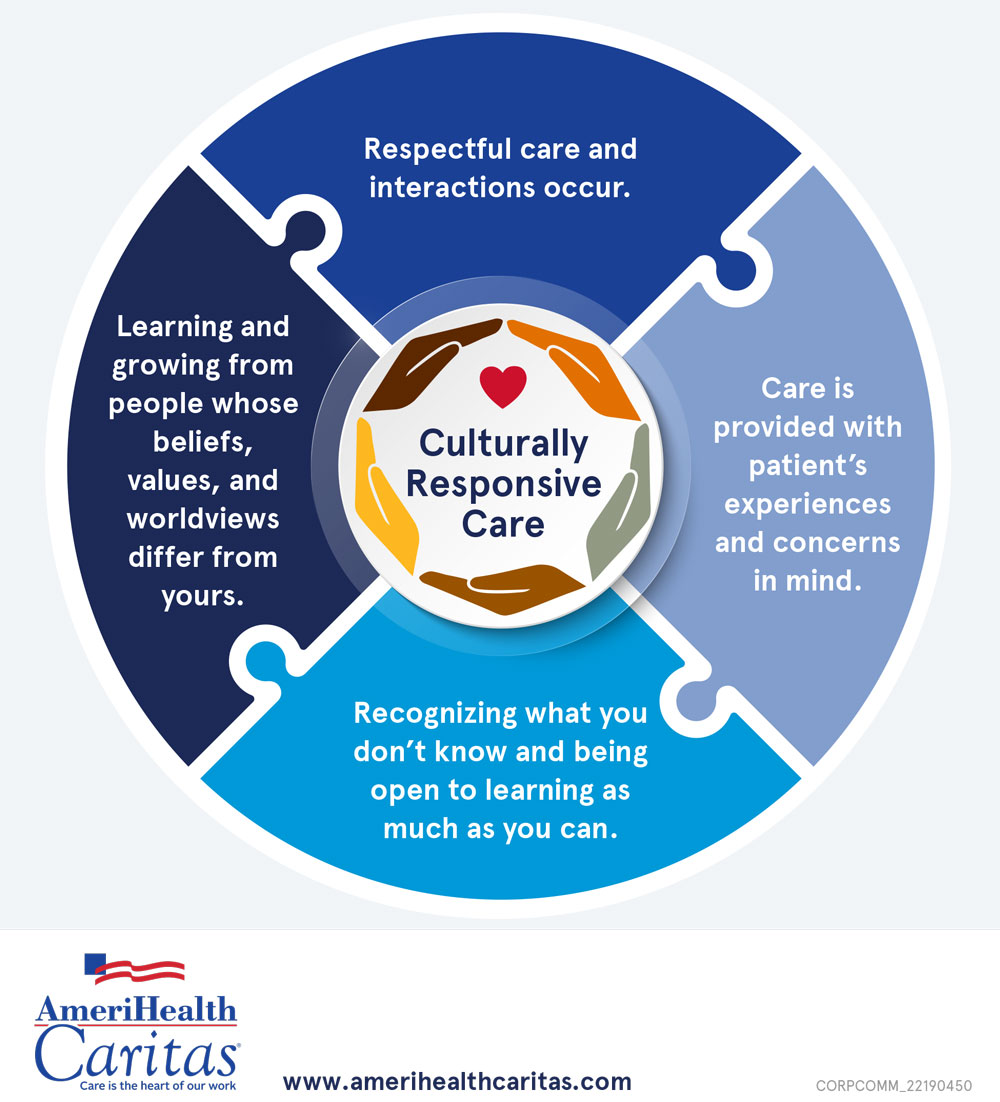Cultural Responsiveness Enhances Access to Care and Improves Health Outcomes
Paying attention to cultural practices and norms can make clinical care more effective for diverse populations
Newtown Square, Pa.

Read more about Cultural Responsive Care (PDF).
Physicians and their patients can perceive health care experiences differently when they don’t share the same culture, ethnicity, and language. Such situations can even create an environment of mistrust, misperception and miscommunication, leading to poor health outcomes, according to AmeriHealth Caritas, a national leader in Medicaid managed care.
To minimize this potential, AmeriHealth Caritas encourages health care professionals and organizations to develop a culturally responsive environment where the delivery of health care services responds to the social, cultural and linguistic background of their patients. The effort to provide care with a greater awareness and sensitivity to a patient’s unique and inherent characteristics has been shown to improve health outcomes, patient satisfaction and the overall quality of care.
Cultural responsiveness has been an essential component of patient care during the pandemic, said AmeriHealth Caritas Director of Health Equity Danielle Brooks. According to the National Center for Culturally Responsive Educational Systems (NCCREST), “cultural responsiveness is the ability to learn from and relate respectfully with people of your own culture as well as those from other cultures.”
“Cultural responsive care helps providers build trust with their patients and provides opportunities to share the decision-making process when planning care,” Brooks said. “To meet patients where they are, we encourage our providers to be mindful of the perspective of their patients.”
There are several ways to promote cultural responsiveness, according to Brooks: health care providers can recruit and hire support staff that reflect the communities they serve; provide interpreter services at every point of care for patients whose preferred language is not English; use community health workers who can promote the importance of preventative services; help educate communities on positive health practices; and advocate on the larger concerns of patient communities that might affect health outcomes. Finally, she advised medical professionals be regularly trained on cultural responsiveness.
Black Maternal Health: Where Culturally Competent Care Can Make a Difference
The Centers for Disease Control and Prevention (CDC) recently labeled racism as a fundamental driver of racial and ethnic health disparities. To advance health equity, quality and build a healthier nation, this needs be addressed.1 Racism—both interpersonal and structural—negatively affects the mental and physical health of millions of people, preventing them from attaining their highest level of health.
It also has a generational impact, if left unaddressed. As an example, the maternal health care crisis in the U.S. illustrates how systemic and interpersonal racism contributes to a higher risk of complications and death for women of color.2
Maternal health is particularly important because of the far-reaching impacts it has on families and communities. Access to quality maternal health care ensures the good health of a mother which helps ensure the good health of her newborn child and the rest of her family. The well-being of newborns determine the health of the next generation and can help predict future public health challenges for families, communities, and the health care system.3
To help mitigate this health care crisis, which disproportionately harms Black mothers and their unborn babies, Brooks said AmeriHealth Caritas Medicaid health plans worked with the March of Dimes in 2022 to provide implicit bias training to help its health care providers learn how to identify and address racial disparities and poor health outcomes for these moms.
The course provided an overview of implicit bias, its impact on the maternal infant health crisis, the history of structural racism in the United States, and strategies for providers to both mitigate racial bias in maternity care and commit to a culture of equity.
“Cultural responsive care helps providers build trust with their patients and provides opportunities to share the decision-making process when planning care,” Brooks said.
Some studies have concluded that cultural competency and cultural humility lead to better patient care and higher patient satisfaction, especially for minorities during their interactions with nurses and other medical support staff who are not their primary care physician.4
1Racism and Health. Racism is a Serious Threat to the Public’s Health. https://www.cdc.gov/minorityhealth/racism-disparities/index.html
2Eliminating Racial Disparities in Maternal and Infant Mortality: A Comprehensive Policy Blueprint. https://www.americanprogress.org/article/eliminating-racial-disparities-maternal-infant-mortality/
3Maternal, Infant, and Child Health. https://health.gov/healthypeople/about/workgroups/maternal-infant-and-child-health-workgroup#about
4Robert Weech-Maldonado, PhD, Marc N. Elliott, PhD, Rohit Pradhan, PhD, Cameron Schiller, MS, Allyson Hall, PhD, and Ron D. Hays, PhD. Can Hospital Cultural Competency Reduce Disparities in Patient Experiences with Care? https://www.ncbi.nlm.nih.gov/pmc/articles/PMC3726251/